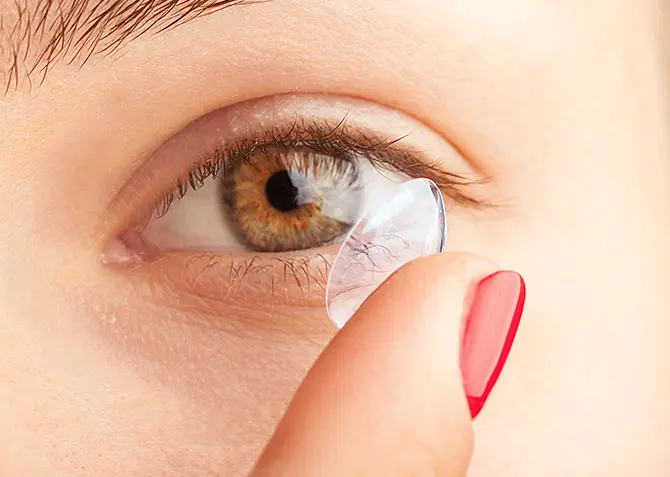Contact Lenses
In today’s world, contact lenses are quite popular since most people prefer them over glasses. There are various reasons why people prefer contact lenses, such as aesthetic concerns, lifestyle or convenience. Even though they require more care than glasses, they are much more comfortable and offer a full range of vision. So, if you would like to know more about contact lenses and whether they are best for you, please keep reading.
What is a Contact Lens?
Contact lenses are small, thin and curved discs that are worn to improve vision. It is placed on the surface of the cornea and helps to correct vision problems, such as myopia, hyperopia, presbyopia and astigmatism. Besides prescription use, there are contact lenses that are designed for cosmetic and novelty purposes too.
Types of Contact Lenses
There is a wide range of contact lenses available in different forms to meet different needs. They also differ in wearing patterns, such as daily, weekly, monthly disposable and extended wear.
- Soft contacts
Soft contacts are made from a thin and flexible material. They are much more comfortable than hard contacts and less likely to slip during physical activities.
- Hard contacts
When compared to soft contacts, hard contacts last longer. Yet, it can easily slip.
- Standard (Spherical) contacts
Spherical contacts are a perfect option for short-sightedness and long-sightedness.
- Toric contacts
Toric contacts are designed for refractive errors. Especially, it is a great option for people with astigmatism.
- Silicone Hydrogel Contacts
Silicone Hydrogel contacts offer comfort as it allows more oxygen to the cornea. Therefore, it can be worn longer than regular soft contacts.
- Multifocal Contacts
Multifocal contacts work well with presbyopia which is usually caused by aging.
- Monovision Contacts
While one contact is designed for distance, the other one is designed for near vision. Thus, by tricking the brain, a clear vision is provided.
- Colored Contacts
Colored contacts change the color of the eye. Besides cosmetic purposes, these contacts are also designed for prescription use.
Who can wear Contact Lenses?
If you are planning to get contact lenses, first you should visit an optometrist or ophthalmologist. After a comprehensive eye examination, it will be determined whether contact lenses are right for you or not. Also, you should remember that it takes more time to adapt to contact lenses, when compared to glasses.
Mostly, people experience no problems wearing contacts. However, it is not suitable for people who have dry eye syndrome, repeated eye infections and severe allergies. In these cases, contact lenses increase the risk of infection. Special care to clean your lenses is also vital since poor hygiene can lead to serious eye infections. If you are experiencing eye discomfort, pain, redness and blurry vision, consult an ophthalmologist right away.
Contact Lenses Prices in Turkey
Depending on the type and wearing patterns, the prices of the contact lenses vary. Compared to European countries, high-quality contact lenses are much more affordable in Turkey. If you wonder whether contact lenses are a better option for you and have any questions about contact lenses and prices, do not hesitate to contact us.


